 Whether they be silents or talkies, King Vidor excelled at making realistic, mature films that treated adult audiences to adult stories while at the same time capturing tiny slices of American life. The Wedding Night is no exception. Unlike many of the Vidor titles I’m familiar with that portray an all-encompassing life story, such as The Crowd (1928), H.M. Pulham, Esq. (1941), and An American Romance (1944), The Wedding Night is a smaller movie about a single moment in the lives of a few intertwined people. It presents a clash of cultures right from the opening credits, where a quiet, sentimental piece of classical music plays over a simple tapestry decorated by an equally modest floral design before shifting into a jazzy tune with Manhattan pictured in the background.
Whether they be silents or talkies, King Vidor excelled at making realistic, mature films that treated adult audiences to adult stories while at the same time capturing tiny slices of American life. The Wedding Night is no exception. Unlike many of the Vidor titles I’m familiar with that portray an all-encompassing life story, such as The Crowd (1928), H.M. Pulham, Esq. (1941), and An American Romance (1944), The Wedding Night is a smaller movie about a single moment in the lives of a few intertwined people. It presents a clash of cultures right from the opening credits, where a quiet, sentimental piece of classical music plays over a simple tapestry decorated by an equally modest floral design before shifting into a jazzy tune with Manhattan pictured in the background.
The city folk are represented by the Barretts, Tony (Gary Cooper), a formerly hot shot novelist, who’s foundered since his debut, and Dora (Helen Vinson), his sophisticated nightlife accomplice, who helps Tony run through his royalties while seeking out new adventures. After Tony’s publisher (Douglas Wood) refuses his latest submission, a self-acknowledged piece of tripe that Tony only wrote in hopes of padding his wallet, the Barretts have no choice but to abandon expensive New York for the old Barrett homestead in the Connecticut countryside. The roads there are lined with tobacco fields (Dora mistakes them for cabbage patches) tended by the immigrant Poles, who use the crops to make American dreams come true, while grasping tight to their own culture and traditions.
Tony and Dora settle into a previously unappreciated house handed down by Barrett forebears. The brunt of the labor is taken on by their man Friday, Taka (Otto Yamaoka), lugging in their belongings—“That’s the most important item in the household,” Dora advises Taka as he hauls in a case of Scotch—while Tony handles simple household repairs. Outside a pair of neighbors try to get their plan straight as they edge onto the property. Father and daughter Jan (Sig Ruman) and Manya Novak (Anna Sten) hope to convince their new neighbors that a certain parcel of land they own is no good, unused, and not worth more than five thousand dollars, which is all true. As Bill Jenkins (Walter Brennan) mentioned to the Barretts when he drove them through town, the Polish immigrants in the area were land crazy, buying up as much as they could to plant more tobacco. There’s an immediate spark between Tony Barrett and Manya, as he apologizes after first suspecting they’d come looking for work. Manya first offers four thousand for Tony’s land, and bumps her offer to five after she misconstrues his shock as a reaction to a poor offer. Excited, Jan asks if Tony will take the deal, to which Tony replies, “There are four answers to that: absolutely, positively, definitely, and yes.” He needs the money.
Tony pays a visit to the Novaks the next day around dinner time to complete the property transaction. Asking what smells so good in the kitchen, and revealing that he’s never before had prune soup, earns him an invitation to the busy Novak dining table. The Sobieskis arrive before dinner, and Manya’s father reveals the reason for his latest land purchase by cementing a marriage arrangement between Manya and Fredrik Sobieski (Ralph Bellamy) right in front of an uncomfortable Tony and a horrified Manya. Fredrik is a husky farm boy with manners that match his brutish appearance. “Say, you look good,” he tells Manya, pinching her cheek and smacking her shoulder. At dinner Tony and Manya exchange glances across the table, their mutual longing making it easy to forget how Manya’s culture and Tony’s marriage complicate what up to now has been entirely a strong chemical attraction. Reality smacks them both at once when Manya’s father brings up the subject of his daughter and Fredrik’s now fully arranged marriage. Fredrik eagerly complies when Jan Novak orders him to kiss his daughter, who sits next to him at the table. Tony and Manya both die a thousand little deaths with each passing moment.
Meanwhile, Dora Barrett waits impatiently for her husband to return. She’s had Taka pack Bill Jenkins’ car with their luggage and gives her husband a loving scolding when he arrives back to the house late from the Novaks. The couple had made plans to return to New York with the money from the sale of Tony’s land, so Dora is anxious to make sure that the sale went through. It did, Tony tells her, but, to Dora’s dismay, he’s staying right where he is. “I’ve found my next book,” he tells her. The Poles, they’re a godsend to him. “Like something out of another world.” There’s a good deal of back and forth as Dora does her best to remain loyal wife at husband’s side, deciding she’ll lay in a case of Scotch and some novels, but Tony asks her not to be dutiful. Tony hands the entire five thousand over to her and prompts her to spend it all on a good time in New York. She’s been at his side through his entire struggle and now he feels he’s on the verge of a breakthrough. Dora has her doubts because Tony’s done this before, but finally decides it’s best for their marriage if she goes. They’d drive each other crazy alone all winter in the creaky country house.
You can see where this is going. Manya initially resists Tony. He tells her she’s subject of his latest book, but she’s unimpressed when he mentions he’s only written a few lines so far. He catches her off-guard one morning when Manya comes to deliver the milk, and Tony coaxes her into his parlor by revealing that he’s now finished several chapters. Tony’s novel is about more than Manya and the Polish immigrants though. It’s also about his and Dora’s frayed relationship, leaving Tony with the challenge of writing his own future as his character is left to choose between the young immigrant woman he’s instantly fallen in love with and his more mercenary, though still loving, wife of five years. Manya’s friendship with Tony gets her into trouble with her father and fiance, and when Dora makes a surprise trip back to Tony she’s unsettled and afraid by what his first draft reveals.
This is the best performance I’ve ever seen Helen Vinson give, and I’ve seen a lot of her work. There are more than traces of her usual characters in Dora. But the mercenary gold diggers and petulant society wives that Vinson usually plays are colored here by a sense of humor, lighter personality, and a deep love of her husband.
Vinson’s best scene, in fact, one of the best scenes in all of The Wedding Night, comes as she’s interrupted from reading Tony’s manuscript when Manya, ignorant of Dora’s arrival, pays a desperate visit after the pressures from home become too much. “I just finished the chapter where Daphne talks with Sonya,” Dora says, naming the characters Tony has so obviously named after she and Manya. “I found it interesting, but not very true. What do you think?” Manya is uncomfortable at first, stuttering as she answers, so Dora persists. “If I were Daphne, I wouldn’t go at all,” she says. “He and Sonya are so far apart, they could never meet on common ground.” Plus too much has passed between Stephen, the Tony character, and his wife of five years. “But she’d fight to keep it. That’s the way I’d write it,” Dora says, thoughtfully adding, “Even though I felt very sorry for Sonya.” With Vinson as Dora, you expect the character to bear fangs, but it never happens. Dora is tactful, but forceful, empathetic, but unwilling to let go of what is hers. Dora’s problem is, Tony feels just as Manya does.
Gary Cooper’s quiet intensity, his lovable clumsiness at close quarters, and his strong sense of will power all shine through as Tony Barrett. In Design for Living (1933) Cooper played the artist, not the writer, but the opening of The Wedding Night almost feels like a sequel catching up with the earlier movie’s George after he, Tom, and Gilda inevitably went their separate ways. Tony Barrett has had a few too many, and he’s just slugged a pal (George Meeker) for telling him “You’re through and you don’t know it.” Tony’s wife, Dora, tends to the friend’s eye as they all bicker back and forth in the bathroom at a party. This is the more cosmopolitan, carefree Cooper of the period, similar also to the character he plays in Now and Forever (1934) as Shirley Temple’s father. This Cooper is a cad and a wastrel, but he’s still Cooper, so there’s an unexpected depth that reveals itself after his characters find out that they do care about those around them. When he first meets Manya he’s aggressive in pursuing her. She has to fend him off. You get the feeling that Tony may have already had a marital indiscretion or two by his behavior. He’s quickly tamed by love once he more fully understands Manya’s honesty and simplicity. She fuels him going forward. Fuels his work.
Forever doomed as “Goldwyn’s Folly,” Anna Sten deserves to historically shed a nickname that wholly reflects her contemporary box office draw and completely ignores her timeless talent.
I’ve only seen Sten in one other film so far, her Hollywood debut Nana (1934), but that one put an immediate stop to my own ignorant usage of “Folly” insult. The Wedding Night elevates Sten beyond even that in my eyes, as someone whose films I’ll now seek out.
Her accent is no worse than many of her peers, as strong as Dietrich’s, possibly even less than Garbo’s. She’s as gorgeous as either, my tastes say the most beautiful of that particular trio, and if you still find her “too European,” she’s at her best in the more universal silent moments, where she can really emote. There’s a scene when her Manya first really begins to return Tony’s affections. They’re alone, standing face to face and suddenly all the camera shows are their profiles as their faces come even nearer. We expect a kiss, but we don’t get it, not yet. Instead Sten, her Manya so choked up we can feel the tightness in our own throats, brings a few of her fingers, not even a full hand, into view, as she’s tempted to, practically needs to, stroke Tony’s cheek. But she doesn’t. The scene ends without consummating even the slightest touch, and it’s all the viewer can do not to gasp, to release some of the tension that Vidor and Sten have built. When Manya and Tony do finally kiss, it’s even more exasperating. She’s forced to stay the night when a blizzard picks up outside. Tony tucks her into bed, the covers restraining Manya from the neck down as their eyes lock and Tony leans in. After the kiss he pulls away, departing for her own bedroom and leaving Manya, Sten, with an expression combining sharp pain and pure ecstasy. She’s very good.
Three outstanding performances captured by Vidor in a story that colors romance with a peek at a traditional patriarchal immigrant family being invaded by the more carefree, less disciplined American values that were avoided until they followed Manya home. This clash implodes when Manya returns to the Novak home to reject Fredrik and stand up to her father, declaring that she does not want to live a life treated by Fredrik as her father has treated her mother her whole life. This earns a slap from a much more imposing and intense Sig Ruman that we’re used too seeing.
“You think you’re American girl, huh? With no respect for your parents,” he says. “Well, you are Polish girl. You do what your father says. You marry Fredrik on Monday.” The tension hikes another notch moments later as the scene between Sten and Vinson described earlier soon follows.
The humor can be a little hokey, but it’s applied in small doses. The ending is not what you want it to be, which makes it all the more shocking and probably a final nail in the casket when it relates to 1935 box office figures. With the Production Code in force, it’s likely the only ending The Wedding Night could have, but even if it disappoints you, the final scene, a soliloquy by Cooper with Vinson slowly disappearing from view, makes it a worthwhile sacrifice. The Wedding Night is well-acted, touching, shocking in a few spots, and mature, with interesting visuals provided especially by the Polish ceremony of the title. An exciting movie to view for the first time.
My thanks to Warner Archive for providing a review copy of their recent manufactured-on-demand DVD-R of The Wedding Night – Pick up your copy here. All accompanying screen captures were grabbed from my copy of that Warner Archive disc.


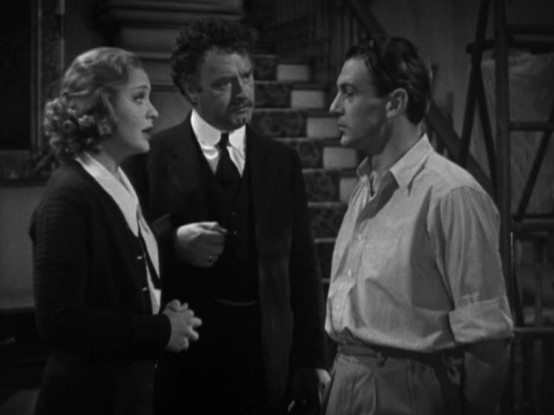

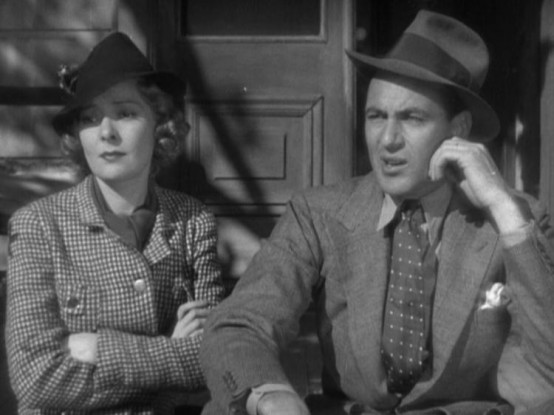
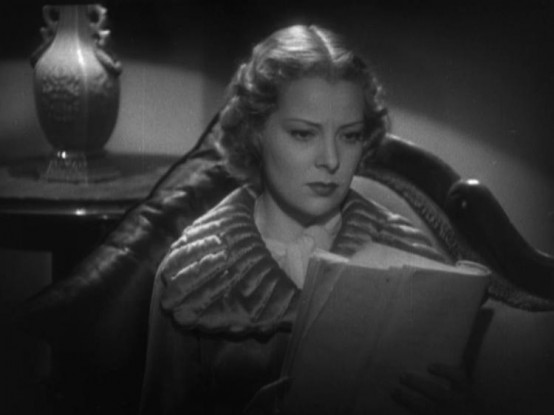

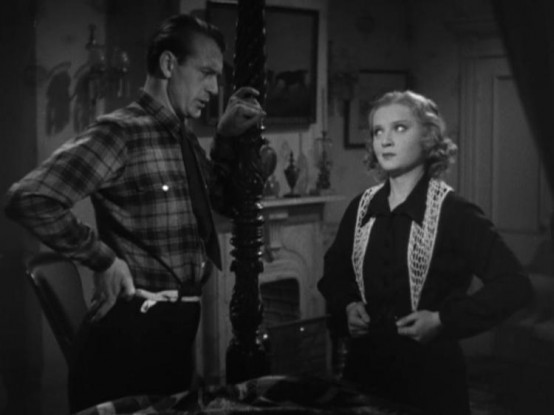
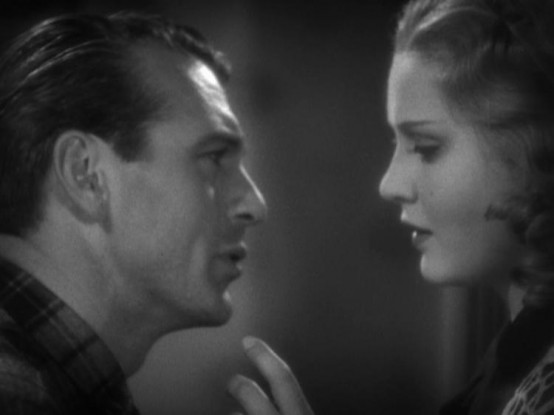
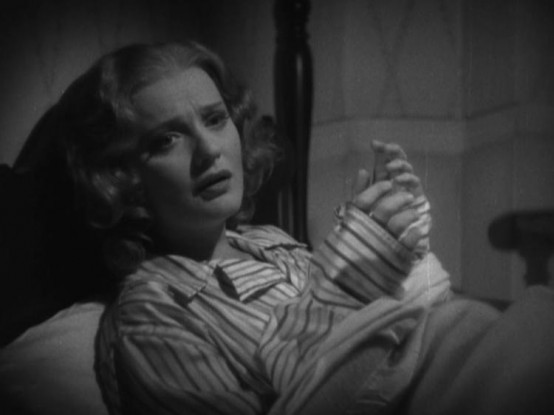
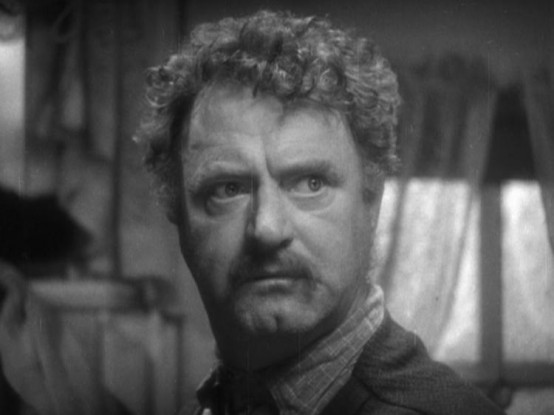
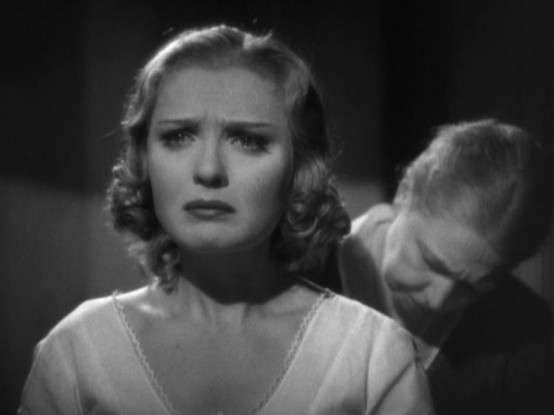

Really enjoyed this piece, Cliff – I’ve increasingly become a fan of Anna Sten and reviewed this film a while back as well as writing a more recent piece about the actress at my blog. Glad to see you also reject the ‘Goldwyn’s Folly’ tag. (Reminds me that Bob Dylan was also known as ‘Hammond’s folly’ – has anyone been known as somebody’s folly where this was really the case?!)
I actually think ‘Nana’ is the weakest of the films by Sten that I’ve seen, although she is very good and the problems are down to the scriptwriters. She’s excellent in the German film ‘The Brothers Karamazov’ (1931), which desperately deserves to be rediscovered, and I also really liked Rouben Mamoulian’s ‘We Live Again’, where she stars with Fredric March. Several people commenting at my blog recommended her silent work, in particular the Russian film ‘Girl with a Hatbox’, which I’ve been meaning to watch but haven’t got to yet.
I also really like Gary Cooper and it’s interesting to see him in a different role like this rather than his more familiar persona – and, as you say, Helen Vinson is excellent too. I haven’t seen very many of her films but will watch out for her. What did you think of Ralph Bellamy in this? I thought it was interesting to see him playing a more villainous version of the ‘Ralph Bellamy character’, though it’s a shame he is saddled with the accent.
Hi Judy, thanks for the great comment!
I knew I should have included a paragraph about Ralph Bellamy! I thought the accent worked on him, and I thought he was very good as, well, like I do say up there, a brutish role. He’s so insensitive, so tactless, so crude, yet I didn’t completely despise the character, because you can see it’s all part of who he is.
And it didn’t really fit the tone of my review, but he has my favorite line in the entire movie: “Hey, wanna watch me while I kill pigs?” What a romantic!
I’m almost positive I have a copy of We Live Again around here someplace, so I am going to seek it out. I’ll honestly be surprised if I like Sten in anything more than I do here, but if I ever hunt down those European titles, I’m ready to be surprised!
I suppose it all started with Seward and Alaska, and that worked out too.
Heading over to check out your Sten piece. Thanks again—
Cliff
Thanks in return for the great reply, Cliff. I admit as a Brit I wasn’t aware of the ‘Seward’s folly’ description of Alaska, but have just looked it up – so you’ve given me a history lesson. I think ‘The Wedding Night’ may be my favourite of hers too, though I did really like ‘We Live Again’ and ‘Brothers Karamazov’. I’d forgotten that line of Bellamy’s in this – wow, it really sums up the character.
And if Bellamy didn’t get you to chuckle, Sig Ruman follows up by scolding her: “Manya, Fredrik wants you to watch while you kill pigs.”
And to top it off, you hear these horrible pig squeals once she goes inside.
Shoot, I always forget that I may be talking with someone from outside the US, sorry if the reference was a little obscure! Actually, I’m all the more amazed now by how much we echoed each other on certain points—tab that up to this one being a universal classic!
No, it was great to learn about that reference – I’d wondered where the ‘folly’ descriptions started! And I agree that our similar comments on some aspects show how this film, and Anna Sten, appeal on both sides of the Atlantic.